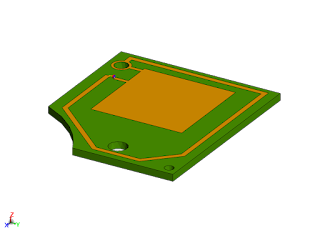Altair Engineering, a company that markets Engineering and Design software sends out a monthly news letter.
My email address ended up on one of their lists.
This is an extract from one of mailings:
Does holding a wireless car key-fob to your head extend the range?
 |
| The chip. The loop around the perimeter is the antenna for the 315 MHz signal |
 |
| Gain chart, plan view. Chip floating in space. |
 |
| Gain chart, side view |
Then a human body was added to the simulation.
 |
| It was interesting that a fat, healthy side-lobe forms off the human's "weak side". I never would have anticipated that. The weakest signal is behind |
 |
| The optimum positioning for the fob was to place it on TOP of your head. |
If signal decreases by distance^2, then 10dB should triple the distance the signal can travel and still actuate the circuit in the vehicle.
This work was not replicated for people who cranial cavity is filled with a vacuum or air.


I wonder if it will help unlock my failing memory.---ken
ReplyDeleteTV Program for kids demonstrated this , more or less. "DIY Sci" They do science experiments for kids. In one episode the main character needed to unlock his car which looked to be about 50 yards away so his assistant could get inside. He put the remote on his head and hit the button and it worked. He stated it was mainly the radio waves being amplified by the water ( fluids) inside your skull. Clearly it worked.
ReplyDeleteSo you could call the main guy in the experiment a "Waterhead?"
DeleteMellon-head
DeleteMust be nice having a truck with electric locks. On the other hand nobody wants to get near my beater 1986 nissan truck, so why lock it?
ReplyDeleteDid they do any testing on the effective range impact of wearing a tin foil hat ? (I'm not up on tin foil hat design, but maybe there's a shape that increases the remote's range substantially; are parabolic Stetsons in our future?)
ReplyDeleteI am SO sorry but I just can't resist. It sounds like that Engineering firm has the lobes for business
ReplyDeleteInteresting that somebody finally 'proved' what we already knew...
ReplyDelete